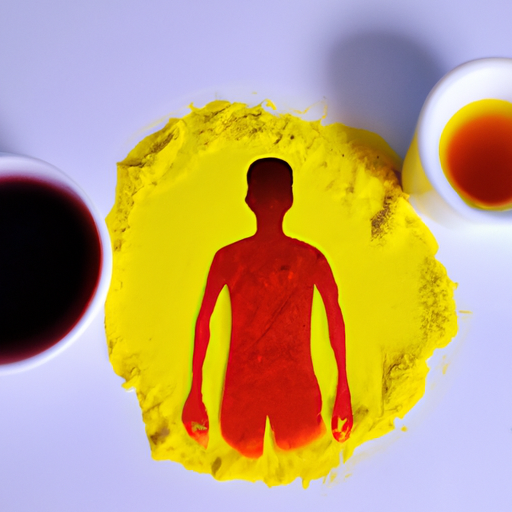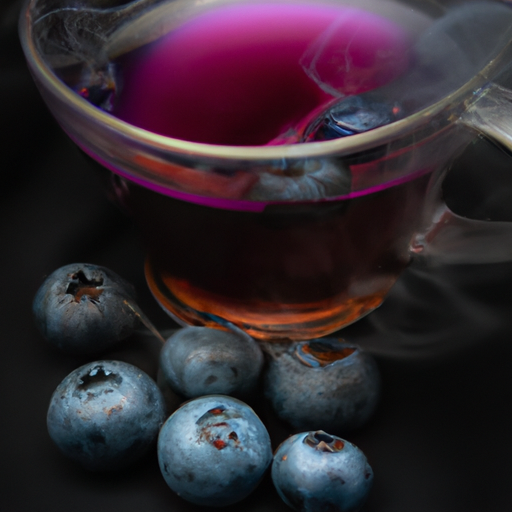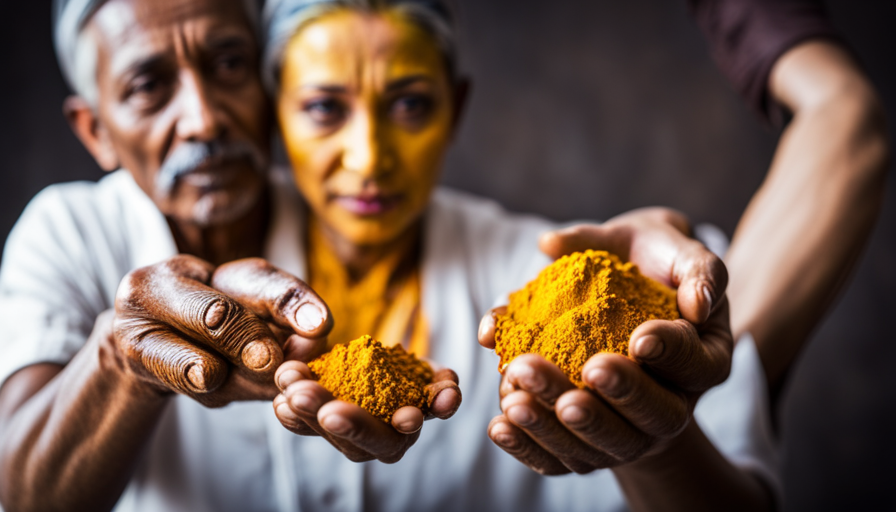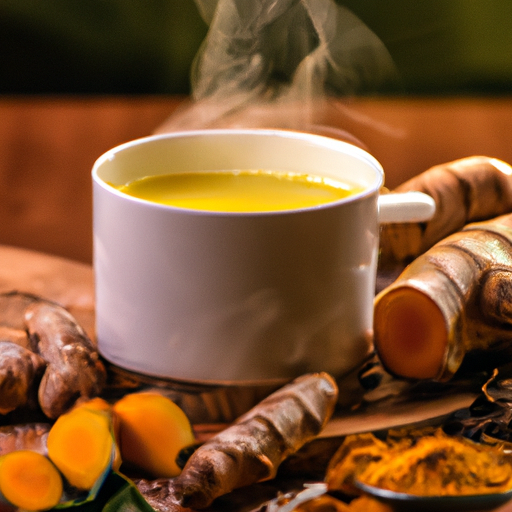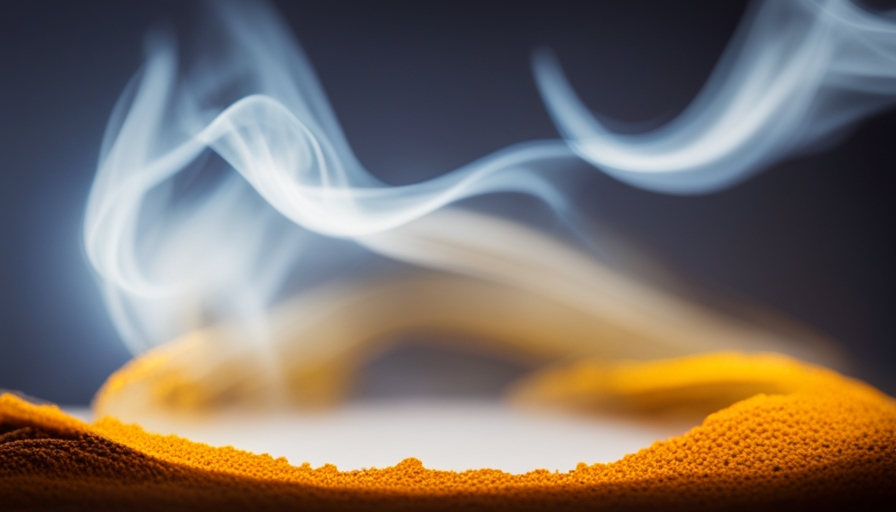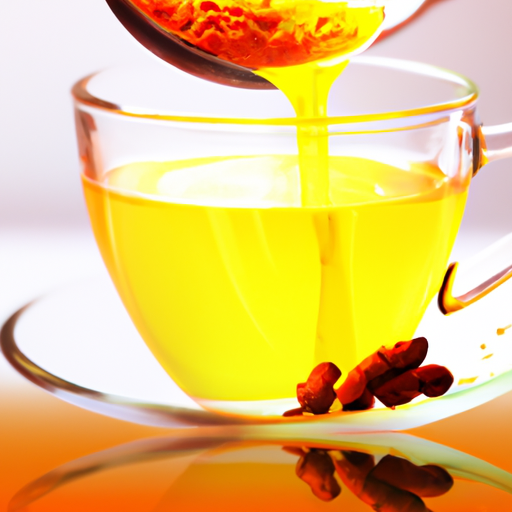Turmeric tea, with its vibrant golden hue and earthy aroma, has gained popularity for its potential health benefits. However, just like any other herbal remedy, it may not be suitable for everyone. Like a key that doesn’t fit every lock, turmeric tea may not be the right choice for certain individuals.
In this article, I will shed light on who shouldn’t indulge in this aromatic beverage. If you’re someone with gallbladder issues, blood thinners, allergies to turmeric, or sensitivities, it’s important to exercise caution when considering turmeric tea. Pregnant or breastfeeding women should also be mindful of their turmeric intake. Likewise, individuals dealing with stomach ulcers, acid reflux, iron deficiency, or bile duct obstruction should be cautious about consuming this herbal drink.
Join me as we delve into the reasons why these specific groups of people may need to pass on turmeric tea. It’s essential to make informed decisions about what we put into our bodies, and understanding who should avoid turmeric tea can help us navigate the world of herbal remedies more confidently.
Key Takeaways
- Turmeric tea should be avoided by individuals with gallbladder issues, as it can increase bile production and worsen symptoms.
- Individuals taking blood thinners should exercise caution when considering turmeric tea, as it can interact with anticoagulant medications and increase the risk of bleeding.
- Those with allergies or sensitivities to turmeric should avoid consuming turmeric tea.
- Pregnant women should be cautious about consuming turmeric tea, as curcumin may stimulate the uterus and increase the risk of miscarriage or preterm labor.
People with Gallbladder Issues
If you have gallbladder issues, you shouldn’t drink turmeric tea because it could potentially worsen your symptoms. Turmeric contains a compound called curcumin, which has been shown to increase bile production. While this may be beneficial for some individuals, it can be problematic for those with gallbladder problems.
If you’ve had gallbladder surgery or are experiencing issues with bile production, consuming turmeric tea could lead to discomfort and further complications. It’s important to note that everyone’s body reacts differently, so it’s always best to consult with your healthcare provider before incorporating any new foods or beverages into your diet.
Now, let’s move on to the next section about individuals on blood thinners.
Individuals on Blood Thinners
As someone who’s on blood thinners, it’s important to be aware of potential interactions with anticoagulant medications when consuming turmeric tea. Turmeric contains a compound called curcumin, which has been shown to have antiplatelet effects and may increase the risk of bleeding. It’s crucial to consult with a healthcare professional before incorporating turmeric tea into your diet to ensure your safety and prevent any potential complications.
Potential Interactions with Anticoagulant Medications
Avoid drinking turmeric tea if you’re taking anticoagulant medications, as it could potentially cause excessive bleeding that’ll make the Red Sea look like a mere trickle. Turmeric contains a compound called curcumin, which has been found to have anticoagulant properties. When combined with medications that also thin the blood, such as warfarin or aspirin, the risk of bleeding can significantly increase.
Additionally, turmeric may interact with other medications, potentially causing liver problems. It’s important to consult with your healthcare provider before consuming turmeric tea if you’re taking anticoagulant medications or have any underlying liver conditions.
Increased risk of bleeding is a serious concern for individuals on blood thinners, and it’s crucial to be aware of potential interactions and side effects.
Increased Risk of Bleeding
Be cautious of the increased risk of bleeding when consuming turmeric tea while on anticoagulant medications. Turmeric is known for its potential side effects, one of which is its ability to thin the blood. This can be beneficial for some individuals as it may help prevent blood clots. However, when combined with anticoagulant medications, such as warfarin or aspirin, the risk of bleeding may be further increased.
It’s important to monitor your blood clotting levels closely if you choose to drink turmeric tea while taking these medications. While turmeric tea has many potential benefits, it’s crucial to consider the potential risks and consult with your healthcare provider before incorporating it into your routine. This will help ensure your safety, especially if you’re one of those with allergies or sensitivities to turmeric.
Those with Allergies or Sensitivities to Turmeric
People prone to allergies or sensitivities might want to skip sipping turmeric tea. While turmeric tea has been praised for its numerous health benefits, including its anti-inflammatory properties and potential to improve digestion, it can also cause adverse reactions in certain individuals.
Turmeric contains a compound called curcumin, which has been known to trigger allergies and sensitivities in some people. Symptoms may include skin rashes, itching, swelling, or difficulty breathing. If you have a known allergy or sensitivity to turmeric, it’s best to avoid consuming turmeric tea. Instead, explore other herbal teas that offer similar health benefits, such as ginger tea or chamomile tea.
Now, let’s move on to the next group of individuals who should exercise caution when it comes to turmeric tea: pregnant or breastfeeding women.
Pregnant or Breastfeeding Women
During pregnancy, it’s important to be mindful of what you consume, including herbal teas like turmeric tea. While turmeric is generally considered safe, pregnant women should exercise caution. Limited research suggests that curcumin, the active compound in turmeric, may stimulate the uterus or promote menstrual flow, potentially increasing the risk of miscarriage or preterm labor.
Additionally, there is insufficient evidence on the effects of turmeric tea during breastfeeding, so it’s best to err on the side of caution and avoid it during this time as well. When it comes to pregnancy and breastfeeding, it’s always best to consult with your healthcare provider before incorporating new foods or beverages into your diet.
When transitioning to the next section about people with stomach ulcers or acid reflux, it’s important to consider the impact of turmeric tea on these conditions.
People with Stomach Ulcers or Acid Reflux
If you’re dealing with stomach ulcers or acid reflux, you’ll want to be cautious about consuming turmeric tea due to its potential impact on these conditions. Turmeric contains a compound called curcumin, which is known for its anti-inflammatory properties. While this can be beneficial for many health conditions, it can also stimulate the production of stomach acid, which can worsen symptoms of stomach ulcers and acid reflux. Additionally, curcumin may interfere with certain medications used to treat these conditions. To help you understand the potential effects of turmeric tea on stomach ulcers and acid reflux, here is a table summarizing the key points:
| Stomach Ulcers | Acid Reflux | Medication Interactions |
|---|---|---|
| May worsen symptoms | May worsen symptoms | May interfere with certain medications |
If you have stomach ulcers or acid reflux, it is important to consult with your healthcare provider before incorporating turmeric tea into your diet. Moving on to individuals with iron deficiency…
Individuals with Iron Deficiency
As someone who’s got iron deficiency, it’s important to be aware of the potential interference that turmeric tea can have on iron absorption. Turmeric contains compounds called polyphenols, which have been found to inhibit the absorption of non-heme iron. Non-heme iron is the type of iron found in plant-based foods and supplements. This can be problematic for individuals who rely on these sources of iron to treat their anemia.
Potential Interference with Iron Absorption
Turmeric tea, when consumed in excess, can hinder the absorption of iron in the body, potentially leading to iron deficiency anemia. This condition affects approximately 1.62 billion people worldwide and causes fatigue and weakness. It’s important to note that turmeric contains compounds called polyphenols, which can interfere with the absorption of iron from plant and animal sources. These polyphenols can bind to iron molecules and make them less available for absorption in the digestive system.
Additionally, turmeric can also interfere with the effectiveness of iron supplements or medications used to treat iron deficiency anemia. In some cases, excessive consumption of turmeric tea can lead to digestive issues such as bloating, gas, or diarrhea. Considering these potential interferences with iron absorption and digestive issues, it is advisable for individuals with iron deficiency to limit their consumption of turmeric tea. This limitation is especially crucial for those undergoing anemia treatment.
Impact on Anemia Treatment
When managing anemia, it’s important to be aware of how certain dietary choices can impact treatment outcomes. Turmeric tea, which has gained popularity for its various health benefits, may have an impact on anemia treatment.
One potential concern is its effect on the menstrual cycle. Some studies suggest that turmeric may have an influence on hormone levels, potentially altering the regularity of menstrual periods. This could be problematic for individuals with anemia, as heavy or irregular menstrual bleeding can worsen iron deficiency.
Additionally, turmeric tea may have an effect on liver health. The liver plays a crucial role in iron metabolism and any impairment could hinder the absorption and utilization of iron. Therefore, individuals undergoing anemia treatment should exercise caution when consuming turmeric tea.
For those with bile duct obstruction, another potential concern arises.
Those with Bile Duct Obstruction
As someone who’s studied the effects of turmeric tea on various health conditions, it’s important to discuss the potential disruption of bile flow in individuals with bile duct obstruction. Bile duct obstruction occurs when there’s a blockage in the tubes that carry bile from the liver to the small intestine.
Drinking turmeric tea in such cases may increase the risk of complications, as it can exacerbate the obstruction and hinder the normal flow of bile. Therefore, it’s advisable for individuals with bile duct obstruction to avoid consuming turmeric tea to prevent any potential harm or complications.
Potential Disruption of Bile Flow
Avoid drinking turmeric tea if you shouldn’t disrupt your bile flow. Turmeric tea has been linked to potential disruptions in bile flow, which can be problematic for individuals with bile duct obstruction.
Bile is essential for the digestion of fats and plays a crucial role in liver health. Turmeric, a spice commonly used in cooking and herbal remedies, contains compounds that can stimulate the production of bile. While this can be beneficial for some, it can pose a risk for those with bile duct obstruction.
Disrupting bile flow in these individuals can further complicate their condition and potentially lead to increased risk of complications. Therefore, it is advisable to consult with a healthcare professional before consuming turmeric tea if you have bile duct obstruction to ensure it is safe for you.
Increased Risk of Complications
There’s a higher chance of complications if you have bile duct obstruction and consume turmeric tea, so it’s best to consult with a healthcare professional beforehand. Turmeric contains a compound called curcumin, which has been found to disrupt bile flow in some individuals. This disruption can be particularly problematic for those with existing bile duct obstructions. Additionally, turmeric has been known to interact with certain medications, potentially leading to adverse effects. It is important to discuss any medications you are taking with your healthcare provider to ensure there are no contraindications. Furthermore, excessive consumption of turmeric tea has the potential to cause liver damage. While turmeric has many health benefits, it is crucial to use it responsibly and under the guidance of a healthcare professional if you have specific health concerns or conditions.
| Potential Interactions with Medications | Potential Liver Damage |
|---|---|
| Turmeric can interact with certain medications, such as blood thinners and diabetes drugs. It may increase the risk of bleeding or alter the effectiveness of these medications. | High doses of turmeric or long-term use may cause liver damage. This is more likely in individuals with pre-existing liver conditions or those taking medications that affect liver function. |
Frequently Asked Questions
Can people with gallbladder issues drink turmeric tea?
People with gallbladder issues should consult their healthcare provider before consuming turmeric tea. There is limited research on its effects on gallbladder health. Additionally, it is important to consider the potential interactions with medications for liver disease.
Is it safe for individuals on blood thinners to consume turmeric tea?
Yes, individuals on blood thinners should exercise caution when consuming turmeric tea. Turmeric contains compounds that can potentially increase the effects of blood thinners, leading to an increased risk of bleeding.
What should those with allergies or sensitivities to turmeric do regarding turmeric tea?
What can individuals with allergies or sensitivities to turmeric do? Are there alternative options for turmeric tea? Learn how to properly manage turmeric intake and explore other herbal teas that may be suitable.
Can pregnant or breastfeeding women consume turmeric tea?
Pregnant or breastfeeding women should consult their healthcare provider before consuming turmeric tea. While turmeric is generally safe, there is limited research on its effects on fetal development and potential risks for breastfed infants.
Is it advisable for people with stomach ulcers or acid reflux to drink turmeric tea?
It is advisable for people with stomach ulcers or acid reflux to drink turmeric tea. Studies show that turmeric can help reduce symptoms of acid reflux and promote healing of stomach ulcers. Enjoy the turmeric tea benefits with these delicious turmeric tea recipes.
Conclusion
In conclusion, it’s crucial to consider your health conditions and consult with a healthcare professional before incorporating turmeric tea into your routine. While turmeric has many potential health benefits, it may not be suitable for everyone. The suspense lies in the potential risks and complications that can arise if consumed by those with gallbladder issues, individuals on blood thinners, allergies or sensitivities to turmeric, pregnant or breastfeeding women, people with stomach ulcers or acid reflux, individuals with iron deficiency, and those with bile duct obstruction.
Prioritizing your well-being and seeking expert advice is essential to make informed decisions about your health.

